#android and ios development company
Explore tagged Tumblr posts
Text
In today’s era of startups and entrepreneurship, many people own their own businesses. They continue to wonder things like, “Why do I need a mobile app? I get a lot of foot traffic, thus I don’t need the app for my business.” In this blog, we’ll talk about why mobile applications are crucial for every kind of business and how they may help it succeed in the marketplace.
To read full post, Visit: https://tech.eastsons.com/blog/why-mobile-applications-are-important-for-your-business
#android application development company#cross-platform mobile app development#ios development company#android and ios development company
3 notes
·
View notes
Text
How to Create an AI Model: A Step-by-Step Guide

Creating an efficient AI model is crucial for companies seeking a competitive edge in today’s market, projected to reach USD 827 billion by 2030. These models, which can analyze vast datasets, help identify patterns and predict trends, thereby enabling informed decision-making. However, challenges such as data quality and bias remain significant. Companies must set clear objectives, prepare and clean data, select appropriate algorithms, and continuously evaluate and refine their models. By leveraging AI effectively, organizations, including development firms like Devstree, can enhance operational efficiency and unlock new growth opportunities in an increasingly competitive landscape.
#application#mobile app development company#web development#artificial intelligence#ai development#hire ai developers#ai development company#android app development#ios app development#mobile app development#india
7 notes
·
View notes
Text
Top Reasons to Choose a Mobile App Development Company for Your Business Growth
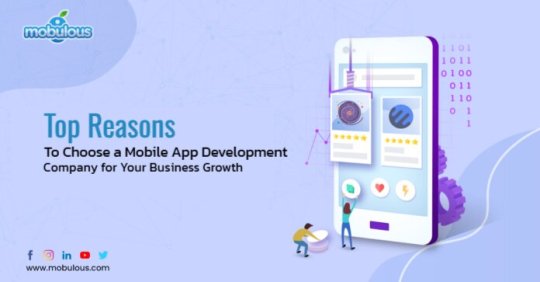
Building a mobile app for your business isn't just a trend anymore—it's a necessity. Whether you're running a small startup or managing a growing enterprise, mobile apps have become a powerful way to connect with customers, streamline processes, and scale your business. Today, I want to share why working with a mobile app development company could be the smartest investment you make this year.
Why Mobile Apps Matter for Your Business
As someone who loves exploring the world of technology, I can confidently say that mobile apps are no longer a luxury—they’re a necessity. They help businesses connect with customers, streamline operations, and even generate revenue. Here's why:
Accessibility: Mobile apps give your customers 24/7 access to your products or services.
Enhanced User Experience: Custom apps offer intuitive interfaces and personalized experiences.
Increased Brand Visibility: Your app sits in your customers’ pockets, ensuring constant brand engagement.
Why Choose a Mobile App Development Company?
1. Expertise in Custom Application Development
Creating a mobile app isn’t just about coding; it’s about crafting an experience tailored to your business goals. A custom application development team specializes in designing apps that cater to your unique needs, whether you’re targeting iOS, Android, or both.
2. Cost-Effective Solutions
A professional mobile app development company in India can provide top-notch mobile app development services at a fraction of the cost compared to other regions. India has become a hub for custom application development thanks to its talented developers and competitive pricing.
3. End-to-End Support
From brainstorming app ideas to launching your app on the App Store or Google Play, companies like Mobulous Technologies, a top mobile app development company India, offer comprehensive support. Their services often include:
UI/UX design
App development
Quality assurance testing
Post-launch support and updates
4. Expertise in iOS and Android App Development
Whether you're targeting Apple users or the broader Android audience, partnering with an iOS app development company or an Android app development company ensures your app runs seamlessly across platforms.
Also Read: Top Reasons Why Businesses Choose Custom Mobile App Development
Why Mobulous Technologies Stands Out
When it comes to finding the best mobile app development company, I’ve found that Mobulous Technologies is a name that consistently stands out. Here’s what makes them special:
Top Mobile App Development Company: Recognized globally for delivering innovative apps.
Custom Application Development: Tailor-made solutions designed to suit your business needs.
Comprehensive Services in India: Offering mobile app development services in India that cover every stage of the development cycle.
How a Mobile App Development Company Drives Business Growth
Choosing the right mobile app development company is like finding the perfect business partner. Here’s how they contribute to your growth:
Faster Time-to-Market: Their experience helps you launch your app quickly.
High-Quality Development: With experts in custom application development, your app is built to perform.
Scalability: They ensure your app can grow with your business.
FAQs
Q:1. How do I choose the right mobile app development company?
Look for a company with a strong portfolio, positive client reviews, and expertise in both iOS app development and Android app development.
Q:2. Why should I consider an Indian mobile app development company?
India is home to some of the best mobile app development companies, offering high-quality services at competitive prices.
Q:3. What makes Mobulous Technologies a top choice?
Mobulous Technologies is a trusted name in the industry, known for its innovative solutions, expert developers, and commitment to client satisfaction.
Q:4. How long does it take to develop a mobile app?
The timeline depends on the complexity of the app, features required, and platform. Generally, a simple app takes 3–6 months, while more complex apps may take longer.
Q:5. What is custom application development, and why is it important?
Custom application development refers to building apps tailored to a business’s specific needs. It ensures your app aligns with your brand and meets your unique goals.
Q:6. Can a mobile app development company help with app marketing?
Yes! Many companies, including Mobulous Technologies, offer marketing support to help you promote your app effectively and reach your target audience.
Q:7. How do mobile apps enhance user engagement?
Mobile apps provide personalized experiences, push notifications, and direct access to services, keeping users engaged and boosting customer loyalty.
Q:8. Should I develop my app for iPhone, Android, or both?
It depends on your target audience. An iphone app development company can help you target Apple users, while an Android app development company is perfect for reaching a broader audience. Many businesses choose to develop for both platforms.
Q:9. Are mobile apps scalable for future growth?
Yes, when developed by a professional mobile app development company, apps can be designed with scalability in mind, allowing your business to grow without limitations.
Q:10. What are the costs associated with mobile app development?
The cost varies based on app complexity, design, features, and platforms. Indian companies like Mobulous Technologies are known for providing cost-effective yet high-quality solutions.
Q:11. Do mobile app development companies offer post-launch support?
Yes, most top companies, such as Mobulous Technologies, provide ongoing maintenance, updates, and support to ensure your app runs smoothly after launch.
Q:12. What technologies are commonly used in mobile app development?
Companies use various technologies like Swift for iOS, Kotlin for Android, React Native, and Flutter for cross-platform apps. Discuss your requirements with your development team for the best choice.
Final Thoughts
In a world where mobile apps drive customer engagement and business success, partnering with the right mobile app development company is crucial. Whether you need custom application development or a trusted partner for mobile app development services in India, companies like Mobulous Technologies can help turn your ideas into reality.
#mobile app development#custom application development#mobile app development company#Custom Application Development#iOS App Development Company#Android App Development Company#Mobile App Development Company In India#Best Mobile App Development Company#Top Mobile App Development Company#Mobile App Development Services in India#Top Mobile App Development company India
2 notes
·
View notes
Text
Top Enterprise Software Trends To Follow In 2024 - A complete Guide
Read more Blogs,
Visit Website, Glasier Inc.
Hire swift developer
Hire flutter developer Hire SaaS developers
Hire Android app developers
Hire IOS developers
#android app development#hire saas developers#hire dedicated developers#app developing company#ios app development trends#ios app development services#mobile app development company#app development company#hire saas developer#custom software development#ERP software development company
2 notes
·
View notes
Text
A Comprehensive Guide to Mobile App Design in 2024
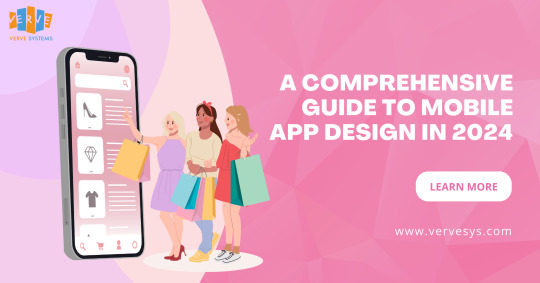
Table Of Contents
Introduction
What is Mobile App Design?
Importance of Creating a Custom Design
Latest Trends in Mobile App UI Design in 2024
Steps to Build the Most Effective App UI Design Process
How Can Verve Systems Help You with Mobile App Design?
Introduction
Mobile app design is a critical aspect of creating a successful and engaging digital product. As the mobile landscape evolves, it’s crucial for businesses and developers to stay abreast of the latest trends and design principles to deliver exceptional user experiences. In this comprehensive guide, we’ll explore the fundamental concepts of mobile app design, emphasize the importance of creating custom designs, delve into the latest trends in mobile app UI design in 2024, outline the steps to build the most effective app UI design process, and discuss how Verve Systems can assist you with your mobile app design endeavors.
What is Mobile App Design?
Mobile app design involves creating a visual and interactive interface for applications that run on mobile devices. It encompasses not only the aesthetics but also the functionality and user experience (UX). A well-designed mobile app considers user preferences, navigation, and the overall journey from the moment a user launches the app until they complete their desired actions.
Importance of Creating a Custom Design
1. Brand Identity:
A custom app design reflects and reinforces your brand identity. Consistent branding across your digital products helps in building brand recognition and trust among users.
2. User Engagement:
Tailoring the design to your specific audience enhances user engagement. A custom design allows for a user-centric approach, addressing the unique needs and preferences of your target demographic.
3. Competitive Edge:
In a crowded app market, a unique and aesthetically pleasing design can give your app a competitive edge. Users are more likely to choose an app that not only meets their functional needs but also provides an enjoyable and visually appealing experience.
4. Adaptability:
Custom designs can be adapted to the specific requirements of your app, ensuring that the user interface aligns seamlessly with the app’s functionality and purpose. This adaptability is crucial for creating a cohesive and intuitive user experience.
Latest Trends in Mobile App UI Design in 2024
As we step into 2024, several trends are shaping the landscape of mobile app UI design. Staying informed about these trends can help designers and developers create apps that feel modern and relevant:
1. Dark Mode Dominance:
Dark mode has become more than just a trend; it’s now a staple in UI design. Users appreciate the reduced eye strain and enhanced visual aesthetics offered by dark mode interfaces.
2. Microinteractions:
Microinteractions, such as animated buttons and subtle transitions, provide feedback to users, making the app feel responsive and interactive. These small design elements contribute to a more engaging user experience.
3. Immersive 3D Elements:
Leveraging 3D elements in mobile app design adds a layer of realism and immersion. Whether it’s interactive 3D models or depth-enhancing effects, these elements create visually stunning experiences.
4. Neumorphism:
Neumorphism is a design trend that combines elements of skeuomorphism and flat design. It involves using subtle shadows and highlights to create a soft, tactile appearance, giving apps a modern and futuristic feel.
5. Gesture-Based Navigation:
With the rise of edge-to-edge screens, gesture-based navigation is gaining prominence. Apps are increasingly adopting intuitive gestures for actions like swiping, pinching, and tapping, enhancing the overall navigation experience.
Steps to Build the Most Effective App UI Design Process
Creating an effective app UI design process requires careful planning and execution. Here are the key steps to ensure a successful outcome:
1. Define Clear Objectives:
Begin by clearly defining the objectives of your mobile app. Understand the target audience, the app’s purpose, and the desired user journey. This foundation will guide the entire design process.
2. Research and User Persona Development:
Conduct thorough research on your target audience. Develop user personas to understand their needs, preferences, and pain points. This information will inform design decisions that resonate with your users.
3. Wireframing and Prototyping:
Create wireframes to outline the basic structure and layout of your app. Progress to prototyping to visualize the flow and interactions. Prototypes provide a tangible representation of the user experience.
4. Iterative Design Process:
Adopt an iterative approach to design. Gather feedback at each stage, make improvements, and refine the design. This cyclical process ensures that the final product aligns closely with user expectations.
5. Responsive Design for Multiple Platforms:
Consider the diversity of devices and screen sizes. Implement responsive design principles to ensure a seamless and consistent experience across various platforms, be it smartphones, tablets, or wearables.
6. Testing and User Feedback:
Conduct thorough testing of the app’s design, functionality, and performance. Seek feedback from real users through beta testing and make necessary adjustments based on their insights.
7. Implementation and Development Collaboration:
Collaborate closely with developers during the implementation phase. A seamless partnership between designers and developers ensures that the envisioned design is translated into a functional and aesthetically pleasing app.
8. Continuous Improvement:
Post-launch, monitor user interactions and gather analytics. Use this data for continuous improvement, addressing any issues, and incorporating user feedback into future updates.
How Can Verve Systems Help You with Mobile App Design?
Verve Systems is a leading provider of comprehensive mobile app design services, offering expertise in creating tailored and innovative designs. Our team of skilled designers and developers collaborates with clients to deliver solutions that align with their brand identity and user needs.
Our Services Include:
Custom App Design:
We specialize in creating custom designs that reflect your brand and provide a unique user experience.
User-Centric Approach:
Our designs are crafted with a focus on user preferences and behavior, ensuring high levels of engagement.
Incorporating Latest Trends:
Stay ahead in the competitive landscape by leveraging the latest trends in mobile app design, keeping your app modern and appealing.
Collaborative Development:
We work closely with your development team to seamlessly integrate the design into the app development process.
Continuous Support and Improvement:
Our commitment extends beyond the initial design, with continuous support and a dedication to refining the app based on user feedback and evolving industry trends.
In conclusion, mobile app design plays a pivotal role in the success of any digital product. By understanding the fundamentals, staying updated on trends, following a robust design process, and partnering with experienced teams like Verve Systems, you can create mobile apps that not only meet user expectations but also stand out in the competitive app market.
Explore More — https://www.vervesys.com/ Contact Us — +1 (732) 402–6854, +91 79 4000 7881 Enquire Now — [email protected]
#mobile app development company india#mobile app design#mobile app development#mobileapp#web development#coding#business#mobile application development#ios app development#android app development#app developers#mobile app developers#mobile app design bd#mobile app developer company
6 notes
·
View notes
Text
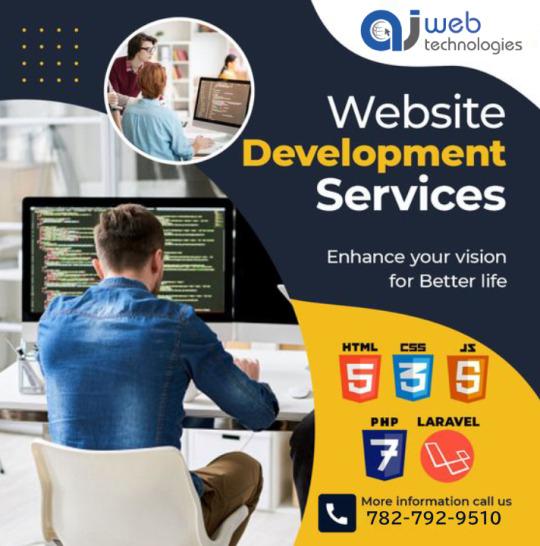
Web Development Company In Dwarka
AJ WEB TECHNOLOGIES has its expertise in providing original Web Development solutions. No matter how complex system is required we create your website in the most elegant form and create web applications that are fast and uses lesser RAM space. It enables our clients to grow the reach since websites developed by us are user-friendly and are not time consuming.
#ecommerce web development company in delhi#php web application development company in delhi#graphic design company in dwarka#web development in patna bihar#app development company patna#best logo design company dwarka india#digital marketing services in patna bihar#seo company in dwarka#android and ios development company in delhi#web hosting in dwarka
3 notes
·
View notes
Text
Transforming Healthcare in Dubai: The Digital Revolution Through App Innovation
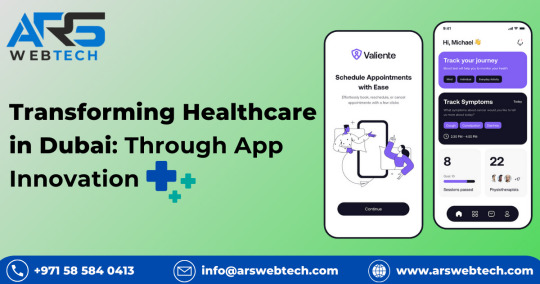
In the United Arab Emirates, the landscape of healthcare has undergone a transformative shift, predominantly propelled by the evolution of app development in the health sector. This exposition, with a particular focus on Dubai, elucidates the diverse ways in which these technological advancements have redefined aspects of patient care, access to medical services, and the overall dynamics of medical procedures.
Dubai stands as a pioneer in this transformative journey, leading the incorporation of cutting-edge healthcare applications. These digital solutions have revolutionized conventional healthcare delivery, encompassing a range of services from remote consultations to the simplification of appointment scheduling. This narrative aims to unfold Dubai's role as a leader in reshaping healthcare, underscoring advancements in access, patient engagement, and the overall efficiency of healthcare processes.
The rise of sophisticated and beneficial healthcare applications marks a significant shift in the UAE's approach to healthcare delivery. User-friendly and enhancing access and convenience, these apps have become fundamental to the modern healthcare system in the UAE. This examination delves into the influence of these applications on the national healthcare landscape, highlighting their contribution to the advancement of digital health solutions.
In the medical realm of Dubai, healthcare applications have emerged as indispensable tools for both healthcare providers and patients. Their functionalities vary, ranging from enabling appointment bookings to facilitating virtual medical consultations and ongoing health monitoring. The surge in healthcare app development in Dubai has democratized access to healthcare, making it more accessible and convenient for all. As these applications continue to refine the healthcare experience, Dubai is at the forefront of integrating technology into daily life, making healthcare an integral part of our daily existence.
The widespread adoption of smartphones in the UAE has been a catalyst for the rapid embrace of healthcare applications. This integration of healthcare apps into daily life has streamlined access to healthcare services, thanks to the increasing use of smartphones.
A notable revolution in healthcare in Dubai is the mainstreaming of virtual consultations. This paradigm shift allows patients to engage with healthcare professionals from the comfort of their homes, significantly enhancing accessibility and convenience. The significant role played by pharmacy delivery app developers in Dubai in facilitating this transition is noteworthy.
In terms of appointment scheduling and reminders, healthcare applications in Dubai have brought about a significant transformation. The emergence of Android app developers in Dubai has led to the creation of platforms that automate appointment reminders and simplify the scheduling process. This technological integration has enhanced the patient experience and contributed to improved health outcomes.
Personalized health information provided through healthcare apps empowers individuals to actively manage their health. These applications, developed with the expertise of IO developers in Dubai, focus on user-friendly solutions, making the healthcare system more efficient and centered on patient needs.
Medication management is a crucial aspect of patient care. Healthcare applications assist users in effectively managing their medications, providing timely reminders, and information about drug interactions and side effects. The synergy of virtual consultations and pharmacy delivery apps is transforming the healthcare delivery model in Dubai, increasing convenience for patients.
The integration of Electronic Health Records (EHRs) through healthcare applications has revolutionized the sharing of medical information among healthcare providers in the UAE. This significant development, supported by E-learning app development companies in the UAE, has enhanced the efficiency of healthcare delivery and strengthened patient safety.
Data analytics generated by healthcare applications provide valuable insights for healthcare professionals in the UAE. This approach, driven by data, facilitates evidence-based decision-making, leading to markedly improved patient outcomes. The analytical capabilities of these applications represent a crucial shift towards a more informed and efficient healthcare system.
While the adoption of healthcare applications raises concerns about the security of medical data, developers in the UAE are committed to implementing robust security measures. This dedication ensures the protection of patient information and aligns with strict data protection regulations, reinforcing user confidence in the use of healthcare applications.
In the UAE, the development of healthcare applications adheres to strict regulatory frameworks, such as the Health Data Protection Regulation. This commitment to compliance ensures the responsible handling of patient data, building trust among users. The emphasis on regulatory adherence highlights the dedication to maintaining high standards of data security and privacy in healthcare applications.
In conclusion, the advent of healthcare applications in the UAE has significantly impacted the healthcare sector. These applications have facilitated easier access to and interaction with healthcare services, becoming an essential part of modern healthcare. As technology continues to evolve, the UAE's healthcare sector is poised for further innovation. This future envisions a healthcare experience that goes beyond providing services, merging technology with compassionate care. Ars Webtech is at the forefront of this revolution, committed to pioneering innovative healthcare solutions and striving towards a future where healthcare is not just a necessity but a personalized journey towards well-being.
#ios app development#mobile app company#mobile app developer company#digital marketing agency#healthcareapp#healthcare app development#web development#android app development
4 notes
·
View notes
Text
#mobile app development company#app development service#ios app development companies#android app development service#android app development company#ios apps development#cross platform application development#hybrid mobile app development#multiplatform mobile app development
2 notes
·
View notes
Text
Are you looking For the Best App Development services in India?

Today, let's delve into the world of custom app development services and the transformative technologies driving innovation in this space. Whether you're a business owner seeking to enhance your digital presence or a developer passionate about crafting unique solutions, understanding the capabilities of various technologies is essential. In this discussion, let's explore how custom app development services leverage Flutter, Native, Android, and iOS technologies to deliver tailored solutions for diverse needs.
Flutter: We are able to develop such hybrid applications that have faster development and increased time-to-market speed. Our developers are ready to serve flexible, materialistic, suitable for all target platforms, compatible with Android, iPhone, and web platforms, and UX and UI technology-based apps.
Native Development: We intend to develop cross platform applications that natively interact between the Android and IOS platforms. Our team is dedicated to developing reliable apps with minimal complexity, using Agile methodologies, paying close attention to app UI design, and allowing for easy app migration.
Android: We intend to offer such Android applications that call for plenty of downloads. Our Android developers always think creatively to provide something exceedingly splendid with each client project.
IOS: We are skilled to deliver next-generation iPhone apps that rank at the top of the App Store. Our iOS developers are dedicated to developing extremely scalable, better customer experiences, faster, more assured, and most engaging iPhone apps.
Custom app development services play a vital role in helping businesses navigate the ever-evolving digital landscape. By harnessing technologies like Flutter, Native, Android, and iOS, custom app development services empower businesses to realize their vision and stay ahead of the competition. Whether it's creating cross-platform experiences with Flutter or delivering platform-specific solutions with native development, custom app development services are poised to drive innovation and deliver value to their clients.
Now, I'm eager to hear from you! What are your thoughts on custom app development services and the technologies they employ? Share your experiences, insights, and aspirations, and let's spark a vibrant discussion on the future of custom app development.
If you want to know more Information Visit this link:
https://www.leewaysoftech.com/mobile-app-dev
#app development#best app development company#flutter app development#ios app development#react native#android app development
4 notes
·
View notes
Text
#software company in india#software development company in noida#Website and Mobile App Development Company#Android and iOS App Development company#website and mobile app development company#mobile app development tools android and ios#ios and android app development services#ios and android app development#Web Development Company#Ecommerce Application Development#Software Development Company in Delhi/Ncr#Software Development Company in India#Software Development Company in Noida#Software Development Company#App Development Company in Delhi/Ncr#App Development Company in Noida#ios mobile app development company in Noida#ios mobile app development in Noida#Billing & Invoice Software Development Company in Noida#Billing & Invoice Software Development Company Near me#mobile app development company#website designing company in delhi ncr
2 notes
·
View notes
Text
#custom mobile app development services#ios app development#mobile game development#android app development#app development#web development#quick startapps#mobile app development#app development company#software development
2 notes
·
View notes
Text

OdiTek is one of the leading Android Application Development Company in India, offering robust and scalable android app development to our clients globally. Rely on us for Android Application Development.
#android app development#android application development service#best android app development company in india#android app programming#best android tab development company in india#android app development services#ios app development services#ios app development on linux ios app development linus#moblie android app development
2 notes
·
View notes
Text
Next JS vs React: Which Framework to Choose for Optimal Frontend in 2024.

Read more Blogs,
Visit Website, Glasier Inc.
ReactJS development company
Hire Reactjs developers
Hire SaaS developers
Hire Android app developers
Hire IOS developers
#react js vs next js#next vs react#hire react js developers#hire dedicated developers#hire android developers#hire ios developers#react js development company#mobile app development company#ios app development services#custom software development company#custom software development
2 notes
·
View notes
Text
youtube
More Infomation: https://appcrunk.com/
#appdesign#aso#digitalmarketing#seo#ui ux design#android#webdesign#ios#iosdeveloper#ui#customappdevelopment#appmarketing#mobile app developer company#appdevelopers#appdevelopmentcompany#software#ios app development#app store#app maker#Youtube
2 notes
·
View notes
Text
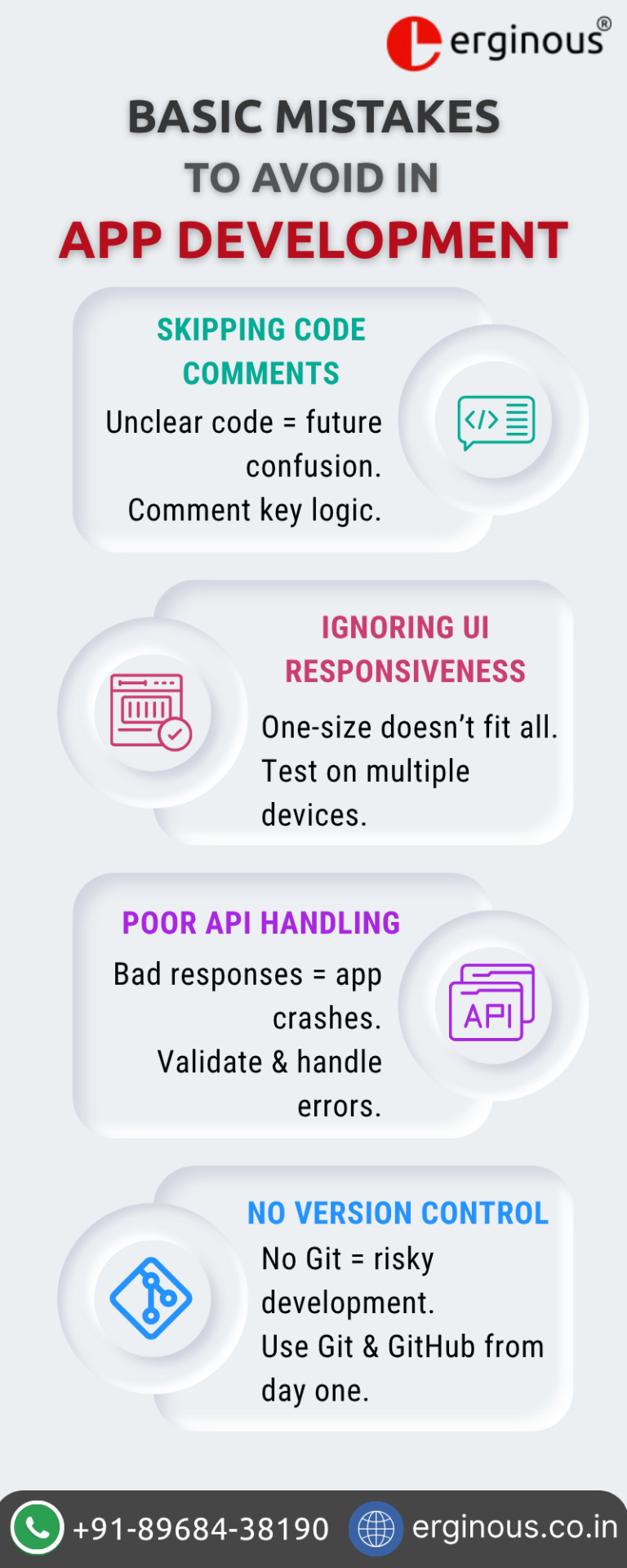
It highlights four common mistakes developers should avoid during app development. Skipping code comments can lead to confusion later, especially when revisiting complex logic. Ignoring UI responsiveness results in a poor user experience across different devices. Poor API handling, such as not validating responses, can cause app crashes. Lastly, not using version control like Git increases the risk of losing progress and hampers collaboration.
To avoid these mistakes and gain hands-on experience with industry practices, enroll in our expert-led app development training at Erginous Technologies.
Visit erginous.co.in or call us at +91-89684-38190 to learn more.
#industrial training#training#internships#erginous technologies#rajpura#app development#app development training#flutter development#android development#ios development#mobile app development#it company in rajpura#software company in rajpura#it company
0 notes
Text
Custom Software vs. Off-the-Shelf: Which Is Right for Your Business in 2025?
Custom Software Development

Introduction: Navigating the Digital Crossroads of 2025
In the dynamic digital landscape of 2025, software isn't just a tool; it's the very lifeblood of a thriving business. From streamlining daily operations and managing customer relationships to driving innovation and gaining a competitive edge, the right software empowers businesses to grow. Yet, for many business leaders like yourself, a crucial question often surfaces: should we invest in a custom software solution meticulously crafted to our unique needs, or opt for a readily available off-the-shelf package?
This isn't merely a technical decision; it's a strategic one that profoundly impacts your operational efficiency, scalability, and ultimately, your return on investment (ROI). With rapid advancements in cloud computing, AI integration, and the ever-present need for robust data security, selecting the right software solution in 2025 is more complex and critical than ever before. This in-depth guide aims to cut through the jargon, offering you clarity, practical insights, and a structured approach to making the decision that truly propels your business forward.
Understanding Off-the-Shelf Software: The "Ready-to-Wear" Solution

Imagine discovering a suit that fits you perfectly right off the rack—this is similar to off-the-shelf software. Also known as Commercial Off-The-Shelf (COTS) software, these pre-built, cloud-based tools, such as Salesforce, QuickBooks, or Asana, are designed to address common business needs. They are typically delivered as Software as a Service (SaaS) through a subscription model.
The Allure: Benefits of Off-the-Shelf Software in 2025
Rapid Deployment & Immediate Impact: This is often the biggest draw. You can subscribe today and potentially start using the software tomorrow. For businesses needing a quick solution to an immediate problem, off-the-shelf offers unparalleled speed to market. You bypass lengthy development cycles and jump straight into leveraging its capabilities.
Lower Initial Investment: Instead of a large upfront capital expenditure for development, you typically pay a recurring subscription fee (monthly or annually). This transforms a CapEx (capital expenditure) into an OpEx (operational expenditure), which can be appealing for budget-conscious organizations or startups.
Proven Reliability & Community Support: These solutions have been tried, tested, and refined by thousands, if not millions, of users. This means most major bugs have been ironed out, and the core functionalities are generally stable. Furthermore, large user communities, extensive documentation, and dedicated vendor support teams are readily available for troubleshooting and guidance.
Automatic Updates & Reduced Maintenance Burden: The vendor handles all the heavy lifting – infrastructure management, security patches, regular feature updates, and bug fixes. Your IT team can focus on other strategic initiatives, freeing them from the operational grind of software upkeep. In 2025, many off-the-shelf solutions are also automatically integrating the latest AI tools and automation capabilities, keeping you current without effort.
Access to Industry Best Practices: COTS software often embeds best practices refined over years across various businesses. This can be invaluable for standardizing processes, especially if your current workflows are less optimized.
The Reality Check: Drawbacks of Off-the-Shelf Software in 2025

Limited Customization & "One-Size-Fits-Most": This is the most common pain point. While some configuration options exist (e.g., custom fields, basic workflow adjustments), off-the-shelf software cannot be molded to perfectly fit your highly specific or unique business processes. You'll often find yourself adapting your way of working to the software's limitations, which can introduce inefficiencies and frustration.
Feature Bloat & Unused Functionality: To appeal to a wide market, these solutions pack numerous features, many of which you may never use. This "feature bloat" can lead to a cluttered interface, increased complexity for your teams, and potentially higher costs for functionalities you don't even need.
Integration Headaches: While many modern SaaS tools offer APIs (Application Programming Interfaces) for integration, achieving seamless, real-time data flow with all your existing, particularly legacy, systems can be a significant challenge. You might end up with data silos, manual data entry, or requiring expensive middleware solutions.
Vendor Lock-in & Dependency: You are inherently tied to your vendor's roadmap, pricing model, and support quality. If they increase prices significantly, discontinue a feature you rely on, or even go out of business, migrating your data and operations to a new system can be a costly, time-consuming, and disruptive nightmare.
Generic Security Posture: While reputable SaaS providers invest heavily in security, a widely used platform is a more attractive target for cyber threats. Furthermore, if your business operates in a highly regulated industry (e.g., healthcare, finance), off-the-shelf solutions might not meet all your specific compliance requirements without significant workarounds or additional tools.
No Unique Competitive Advantage: If your competitors are using the exact same software, it's difficult to differentiate your operational efficiency or unique service offerings based on your tech stack alone.
Is Off-the-Shelf Right For You If…
Your operational needs are standard and well-aligned with common industry practices?
Do you need a solution quickly to address an immediate challenge?
Your budget prioritizes lower upfront costs and predictable subscription fees.
Do you prefer delegating maintenance and updates to a third-party vendor?
Understanding Custom Software: The "Tailored" Masterpiece

Imagine ordering a bespoke suit, crafted specifically to your measurements, fabric choices, and style preferences. This concept captures the essence of custom software. Also referred to as bespoke software, tailor-made software, or custom application development, it is designed exclusively for your organization to meet its specific workflows, challenges, and strategic goals. This could range from a unique customer relationship management system tailored for your niche industry to an AI-powered internal analytics tool or a specialized inventory management system.
The Strategic Advantage: Benefits of Custom Software in 2025
Perfect Fit & Optimized Workflows: This is the paramount advantage. Custom software is designed to mirror your unique business processes, eliminating inefficiencies, manual workarounds, and data silos. It supports your way of doing business, rather than forcing you to adapt to its limitations. This hyper-optimization can dramatically boost productivity and reduce operational costs over time.
Scalability & Future-Proofing by Design: Your business is unique, and it will evolve. Custom software is built with your long-term vision in mind, ensuring it can effortlessly scale up to handle increased data volumes, user loads, or new functionalities as your business grows. You own the code and the intellectual property, granting you full control to adapt it to emerging technologies (like advanced AI models, blockchain, or quantum computing implications) and market demands, essentially future-proofing your investment.
Seamless Integration with Existing Ecosystems: From day one, your custom solution can be engineered to integrate perfectly with your existing legacy systems, third-party APIs, and modern cloud services. This creates a cohesive, unified technological ecosystem, ensuring smooth data flow and eliminating frustrating manual transfers.
Unparalleled Competitive Advantage: A bespoke solution allows you to automate proprietary processes, develop unique features, gain exclusive insights from your data, or offer an unparalleled customer experience that your competitors simply cannot replicate with generic tools. This distinct technological edge can be a powerful market differentiator.
Enhanced Security & Compliance Control: For businesses in highly regulated sectors, custom software offers unparalleled control over your security architecture. You can implement specific, granular security protocols, conduct extensive testing, and ensure strict adherence to industry-specific compliance standards (e.g., HIPAA, ISO 27001, GDPR, PCI DSS).
Full Data Ownership & Control: With custom software, you retain complete ownership and control over your data. This is crucial for privacy, analytics, and leveraging your data assets for future strategies.
Long-Term Cost Efficiency & ROI: While the initial investment is higher, custom software can lead to substantial long-term savings. You avoid recurring subscription fees, eliminate the costs associated with unused features, and gain significant efficiency improvements that directly translate into a higher ROI over its lifespan.
The Realities: Challenges of Custom Software in 2025
Higher Initial Investment: Developing a custom solution requires a substantial upfront capital outlay for design, development, rigorous testing, and initial deployment. This can be a barrier for startups or businesses with limited immediate capital.
Longer Development Cycles: From conceptualization and detailed requirements gathering to coding, testing, and deployment, the process can take several months, or even over a year, depending on the complexity of the solution. This isn't ideal if your business needs an immediate fix.
Ongoing Maintenance & Support Responsibility: Unlike off-the-shelf, you are responsible for the long-term maintenance, bug fixes, security updates, and future enhancements of your custom software. This requires either a dedicated internal IT team or a reliable, long-term partnership with a specialized software development firm.
Reliance on Development Partner: Your success hinges on selecting the right development team. A poorly chosen partner can lead to budget overruns, missed deadlines, or a final product that doesn't meet expectations. Diligent vetting is crucial.
Project Risk: Complex custom software projects carry inherent risks, including scope creep, unforeseen technical challenges, and the potential for the final product to deviate from the initial vision if requirements are not meticulously defined and managed throughout the development lifecycle.
Consider Custom Software If Your Business…
Has unique, core processes that differentiate you from competitors?
Operates in a niche or highly regulated industry with specific compliance needs?
Requires seamless, deep integration with a complex existing tech stack?
Has a clear long-term vision for scalability and adapting to future technological shifts (like advanced AI or quantum computing)?
Sees software as a strategic asset for competitive advantage, not just a utility?
Navigating the Nuances in 2025: Key Decision Factors

The "right" choice isn't universal. It hinges on a meticulous evaluation of your unique business context and future aspirations. Here are the critical factors to weigh in 2025:
Your Unique Business Needs & Workflows:
The Litmus Test: Are your primary business processes unique, complex, or a source of competitive advantage? If yes, forcing them into a generic off-the-shelf solution will likely lead to inefficiency and frustration. Custom software ensures a perfect fit. If your operations are standard (e.g., basic payroll, generic HR), COTS is often sufficient.
Budget & Total Cost of Ownership (TCO):
Beyond Upfront: Don't just look at the initial price tag. Calculate the TCO over 3-5 years. Factor in off-the-shelf subscription fees (which can escalate with more users/features), integration costs, potential workarounds, and training. For custom, include development, ongoing maintenance, and potential future upgrades. Sometimes, the long-term savings and efficiency gains of custom software outweigh its higher initial investment.
Time to Market & Urgency:
Immediate vs. Strategic: Do you need a solution deployed next week to solve a pressing issue? Off-the-shelf is your answer. If you're building a solution for future growth, competitive differentiation, or long-term efficiency, and can afford a development cycle of several months, custom software allows for precision and robustness.
Scalability & Future Growth:
Growth Trajectory: How much do you anticipate your business will grow in the next 3-5 years? Will your data volume, user base, or service offerings expand significantly? Custom software built with scalability in mind can seamlessly handle growth. Off-the-shelf solutions' scalability often means jumping to much higher, more expensive tiers, or hitting hard limits.
Integration with Existing Systems:
The Data Ecosystem: Do you rely heavily on multiple existing software systems (e.g., ERP, CRM, marketing automation, legacy databases)? If seamless, real-time data flow between all these systems is critical for your operations and decision-making, custom integration capabilities are paramount. While many COTS offer integrations, they might not cover all your niche or legacy systems without complex middleware.
Security & Compliance Requirements:
Regulatory Landscape: Is your industry subject to stringent regulatory compliance (e.g., HIPAA, PCI DSS, GDPR)? While off-the-shelf providers invest in security, custom software allows you to build specific, robust security measures and compliance protocols from the ground up, giving you ultimate control and peace of mind.
Maintenance & Support Ecosystem:
Who's Responsible? With off-the-shelf, the vendor handles maintenance. With custom, you need to plan for it. Do you have an internal IT team capable of maintaining complex software, or will you need a long-term partnership with a development firm? Factor these ongoing support costs and resource needs into your decision.
Competitive Differentiation:
Your Unique Edge: Is this software intended to give you a unique advantage in the market? To streamline a proprietary process, offer a never-before-seen service, or analyze data in a novel way that competitors can't easily replicate? If so, custom software is a powerful strategic asset.
Making Your Informed Choice: A Strategic Framework for 2025
Navigating this decision requires a structured approach. Here’s a framework to guide your thinking:
Internal Audit & Needs Assessment:
Gather your stakeholders. Define your core business processes, identify pain points, and articulate your specific needs.
What are your critical functionalities? What problems do you need to solve? What is your long-term business vision?
Quantify potential ROI for each problem solved or opportunity unlocked.
Explore Off-the-Shelf Options Thoroughly:
Research available COTS solutions. Conduct demos, read reviews, and talk to current users.
Evaluate how well each solution meets your defined needs. Can it meet at least 80-90% of your essential requirements without cumbersome workarounds? Be realistic about what "essential" means.
Consider the TCO, scalability limits, and integration capabilities of each COTS product.
If COTS Falls Short, Scope Custom Development:
If no off-the-shelf solution truly aligns with your core, unique, or strategic needs, it's time to seriously consider custom development.
Work with experienced business analysts and software architects to define precise requirements, scope the project and estimate development timelines and costs.
Clearly articulate the ROI of a custom solution – how will it save money, increase revenue, or provide a competitive edge that off-the-shelf cannot?
Consider a Hybrid Approach:
Sometimes, the optimal solution lies in combining the best of both worlds. Use off-the-shelf software for standard business functions (e.g., HR, basic CRM) and invest in custom development for your unique core operations or integrations that differentiate you. This can optimize both cost and efficiency.
Conclusion: Empowering Your Digital Future
In 2025's fast-evolving digital landscape, the decision between custom and off-the-shelf software isn’t about which is universally better—it’s about what aligns with your business’s unique goals, challenges, and growth plans. Off-the-shelf solutions offer quick deployment and predictable costs, while custom software demands a higher upfront investment for unmatched fit, scalability, security, and competitive edge.
By carefully assessing your needs and total cost of ownership, you can choose a software strategy that not only supports but accelerates your business growth.
Need help making the right choice? Partner with CQLsys Technologies—a trusted leader with proven Experience, Expertise, Authoritativeness, and Trustworthiness. Whether it’s custom software, optimized off-the-shelf solutions, or a hybrid approach, we’ll help you maximize ROI and future-proof your applications.
#app development#mobile app development software#app development software#best app development companies#mobile app development#mobile development#flutter app development#app development agency#app development company#android app development software#ios app development#app making company#mobile app development company#android application development#best app developers#app development service#android app development#cross platform app development#web app development#website and app development#Web Development Services#web development#web app developers#website designing company#wordpress web design#website development company#python web development#website design company near me#wordpress experts#web development company
0 notes